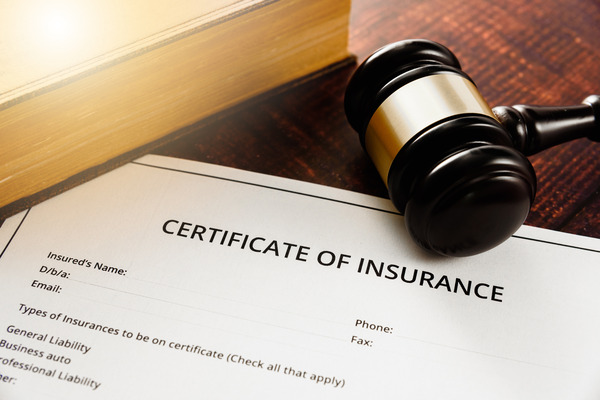What is a COI? COI is defined as liability insurance issued by an insurance company insuring your business. The document does not exceed one page as it highlights the summary of coverage. The certificate of insurance serves as a certification that your enterprise is insured. Some potential clients request for COI as a condition before partnering with you in business.
For instance, a COI will list the names of a policyholder, effective date, type of coverage, limits of the procedure and other vital details. Without a certificate of insurance, a company encounters a difficult time securing the interests of your business. Since most employers assume risks and other related costs incurred by a contractor, COI comes in handy to prove the existence of a policy.
Why Is a Certificate of Insurance Issued?
A certificate of insurance is issued in a situation where significant losses and liabilities are of great concern. Businesses and high-value assets will require a COI to secure their interests in case of an incident. A certificate of insurance is issued to owners of small businesses and contractors to get protection against any liabilities that may arise. Such liabilities include accidents or injuries to workers while carrying out their duties. Usually, the certificate of insurance is issued when a client seeks to protect his business from potential liabilities resulting from daily operations.
Without a COI, a business owner or contractor encounters difficulty winning contracts. It is required by law for businesses to purchase the police to get their employees covered. Whenever contractors are issued, clients will need the contractor to have liability insurance. The insurance cautions them from assuming any responsibilities resulting from injuries, substandard work, and damages.
How Do You Validate a Certificate of Insurance?
Ordinarily, a client requests a certificate of insurance directly from the insurance company and not from a contractor. The purpose of this move is confirming the names on the certificate match the contractor under consideration.
Similarly, the client seeks to check the policy dates to validate the coverage. Any discrepancy in the details provided by a contractor and what appears on the certificate calls for clarification. If the client awards the contract without confirming all COI details, he is assuming any liabilities that may arise.
Who Needs a Certificate of Insurance?
The question does not have a direct answer; it depends on the obligations of a company regarding its collaboration with another company. For instance, if you run a grocery store and another company supplies you with the products, you must ensure the goods are insured.
The need for insurance is to protect yourself from losses if you are supplied with spoilt products, and your employees suffer damages and plane to sue for damages. COI will come in handy to protect you from assuming the liabilities and cover for all damages caused.
Also, if a restaurant is hired to cater for an event, the person hiring will demand COI. Ensuring the restaurant has a valid COI protects themselves from any injuries or damages that the restaurant could cause.
However, requesting the certificate of insurance is not an indication of trust issues between the two companies. It is a way of mitigating risks and ensuring one is covered if something happens while executing a contract. Even when you trust the company, you are cooperating with and have worked with them in the past. Always request for COI every time you sign a new contract to avoid a scenario where you are taking pointless risks and liabilities.
How To Get a Certificate of Insurance?
Following the built-in nature of issuing insurance policies, it’s prudent to highlight the steps to getting your COI. If you are focused on getting your COI in record time and experience as few glitches as possible, here is everything you need to know.
Identify Your Ideal Commercial Insurance
The first step towards getting your COI is identifying a company that offers you coverage that meets all your needs. Also, consider the type of clients you are likely to work with, requiring a particular insurance policy. Small businesses often face more risks in their operations, prompting the need to cover their risks. Here are the common types of business policies offered by insurance companies.
- General liability insurance
- Professional liability
- Commercial property
- Business interruption
- Product liability
- Cyber liability
- Commercial auto insurance
- Workers’ compensation
When you visit a broker or insurance company, they will evaluate your scope of operations and categorize your business to any of the coverage above. However, you will need to keenly look through your business to see the coverage details to ensure it addresses your risks.
Get a Quote
Once you have identified your preferred insurance and the type of policy needed, it’s time to compare quotes. To achieve this, you will need to provide some basic information regarding your employees to get accurate quotes. Also, it would help if you placed a coverage limit and timeframe for the validity of your policy.
When getting quotes, you must list all additional information regarding the scope of your operations. For instance, if you are purchasing coverage to help you win a contract, disclose such information to your insurer. Also, if you wish to make any alterations to a policy you had purchased earlier, this is the time.
Remember, every piece of information you provide here will be used to calculate the number of premiums you will pay. The number of workers on your policy should be as accurate as possible, and the timelines affecting your premiums.
Nonetheless, if the estimates you get are not within your budget limits, continue sourcing for a better policy. Also, you can engage your preferred broker to help you with the search. If still, you cannot find a reasonable budget, consider evaluating your policy details, such as coverage timeframe and the number of workers included. On getting the best COI quote, you can move ahead and purchase it.
How to Access Your COI
The final step of accessing the certificate of insurance will largely depend on your provider. Insurance providers have varying rules regarding access to policies. For this reason, settle for a provider that allows instant access to a digital version of the policy once payment is made.
While insurers provide hard copies, others give a digital copy instantly. The problem with hard copies is they will take days before you can get the document. Thus, if you have needs regarding when you want to have the certificate of insurance, make it known to your provider before purchasing it. As a customer, buy the policy that best suits all your insurance needs.
Bottom Line
Having dug into all the necessary details on the certificate of insurance, it’s always wise to exercise diligence. Get an expert to help you in reading through the details of the policy document. Also, avoid making hurried decisions even when you need the policy within tight deadlines.
Deal with every jargon and paperwork in the policy to ensure you are getting value for money. Remember to ask all questions that run through your head regarding the policy. Avoid signing a document blindly regarding your COI to go through all details. Confirm your name, points regarding the expiry of the policy, and the number of employees. The confirmation will avoid any complications when facing your clients.











